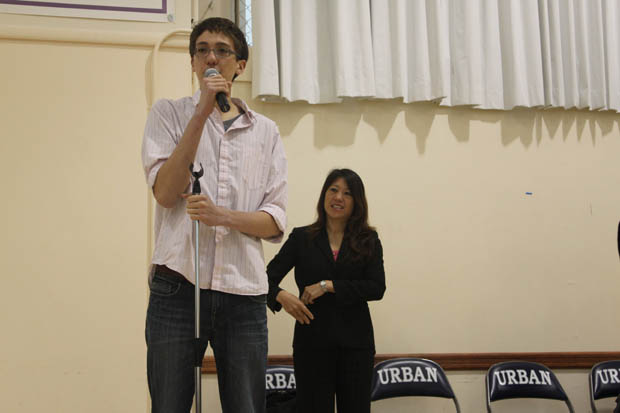Urban’s plan to re-examine the distribution of student leadership roles is being perceived by students as either an oppressive putdown on natural leaders or a change that will allow more students to become leaders.
According to Charlotte Worsley, head of student life, there are about 200 leadership positions currently available to Urban students. “We are always looking for ways to expand the number of students who hold leadership positions, said Worsley. “This year we were mindful of trying not to have the same people hold more than two to three positions where possible. But, this is not a rule, it is just a guideline.”
Marina Chen (’14), who applied only for Urban’s Peer Resource club and didn’t get in, says she feels “disappointed.”
“I didn’t like any other positions,” said Chen. “Now I am stuck. Now, I don’t have a leadership role and so I feel kind of thrown away – like I am not good enough to be a leader.”
Every six years Urban must be reaccredited by the Western Association of Schools and Colleges (WASC). It has now been five and a half years since WASC’s last evaluation. WASC takes the changes Urban suggests for itself and makes them the official recommendations for the school’s improvements.
According to English teacher Courtney Rein, an area where WASC evaluators felt Urban could improve on is leadership opportunities for students. In response to this, the school “made a commitment to creating more leadership positions,” says Forrest. However, the current problem is that a small group of students hold many of the available leadership positions. According to a spreadsheet of Urban leadership positios, 42 students hold multiple leadership positions; some hold as many as six.
Not all students believe a small meritocracy is necessarily bad. “I think more kids should be encouraged to go for leadership,” said Sarah Atkinson (’12), “but if there is a small amount of people who are self-motivated, then they should fill the positions.”
Duncan Magidson (’12) agrees. Limiting leadership would be “a punishment to natural leaders,” he said. “The reason that leadership is concentrated is because certain people will consistently rise to the occasion.”
Elly Fireside-Ostergaard (’12), who holds six leadership positions at Urban, says she would be ready to share top jobs. “I agree with what they (administrators) are trying to do,” said Fireside-Ostergaard. She worries that people who are more qualified will be passed over for leadership positions, but she feels like lots of students need to be involved in leadership in order to “fully represent the school.”
How leadership at Urban is designed may be part of the problem behind how it is concentrated. For example, since Fireside-Ostergaard is the head of the Gay-Straight Alliance (GSA), she also automatically becomes a member of the school’s Multicultural team, both of which are considered major leadership positions.
Cole Larsen (’12) believes that despite the many Urban leadership positions, leadership is still inaccessible to many students because “a lot of the leadership positions are in the more exclusive clubs (ones that have to be applied for at the end of freshman year).”
Some students believe that creating more leadership positions is heading in the wrong direction. “There are way too many leadership positions already,” says Justine Hancock (’13). But at least one teacher disagrees.
“I think it’s great that at Urban all kinds of kids can be leaders,” says Sara Schonwald, service-learning teacher, adding that leaders at Urban “don’t have to fit the extrovert prototype.”
“All Urban students have the capacity to step up and not only be competent but excellent,” says Rein, adding that this is an opportunity for “kids who don’t think of themselves as leaders.”
Despite the WASC recommendation, some Urban students say taking on a leadership role is not part of their academic goals. Ben Brosnahan (’12) holds no leadership positions and says the only reason he would consider having one would be “to get credit for college.”
The WASC recommendations “will help remind us that leadership is doing something well rather than resume building,” says Rein.

